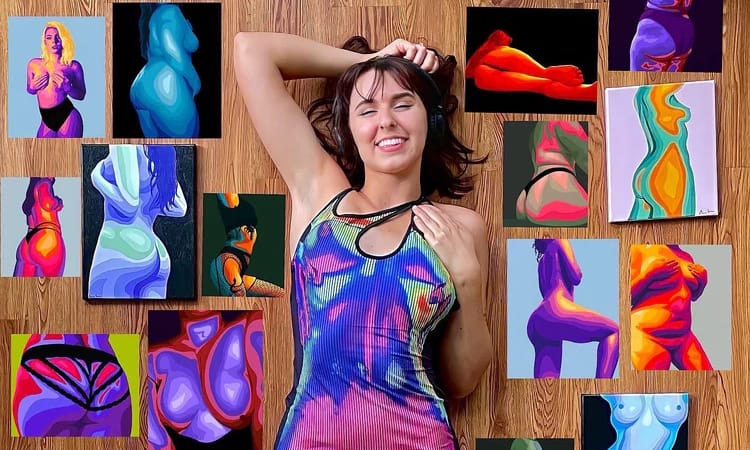The Platform Problem Claims a Victim Who Deserves Better

I don't remember when I first encountered Maggie Phipps, an artist and influencer, but after she appeared in my Instagram feed a few times, I started to follow her work.
Maggie is an artist who became widely followed on Instagram and TikTok because of her paintings, her informative and high-energy videos about art, and her infectious personality. She specializes in nudes, which are obviously not for everyone, and frankly not a genre that would usually appeal to me – but her stylized, colorful work and focus on body positivity stuck out to me.
I felt (and feel) like Maggie is representative of the best a platform like Instagram has to offer: a talented artist, whose niche art was able to find a larger audience due to her visibility on social media. That visibility was boosted, in no small part, by her natural ability to communicate well on camera, making her a more compelling "follow" than other, similar artists – but she has also never been shy about talking up other artists in her space, helping to grow the community around her initial niche.
Of course, as I have talked about many times before, artists and journalists who are reliant on giant, corporate platforms are always dangling by a thread. The same social media giants who made Maggie a viral success have also made it incredibly difficult for her to make and sell her work.
Earlier today, Maggie announced that she was "taking a step back" from Maggie's Girls, her custom art business, and would be looking for a job outside of the arts. The reason? As you might expect, the social platforms she needs to find customers have censored her work, throttled her growth by choking her out of the algorithm, and occasionally banned her.
View this post on Instagram
A post shared by Maggie Phipps (@maggies.girls)
Embedded JavaScript
These platforms tend not to provide much useful information as to what you can do to to prevent actions like these, and if anyone should be safe selling "spicy" art, it ought to be someone like Maggie, whose work is not photorealistic and not pornographic in any way.
To mark her departure, Maggie opened up some commission slots which, along with virtually everything on her online store, is currently marked as sold out.
I'm sure Maggie herself will be fine. She is young, smart, and has already built a business from the ground up. But there is something fundamentally broken about a social media system that allows tens of thousands of bots and phishing accounts to go unpunished, while active, popular accounts selling pretty inoffensive stuff get throttled into oblivion by the algorithm. While Instagram harasses Maggie Phipps for selling her art, they leave not just a million porn-bots, but tens of thousands of impersonation accounts (look! There's one of me, and I'm nobody!) online for months or years at a time.
Unfortunately, there isn't much of a positive spin to put on this story, and likely not much to learn about it that we didn't already know. The bottom line may be, don't rely on these tech-bro grifters for your living if you can avoid it at all.
Of course, who among us really can?




